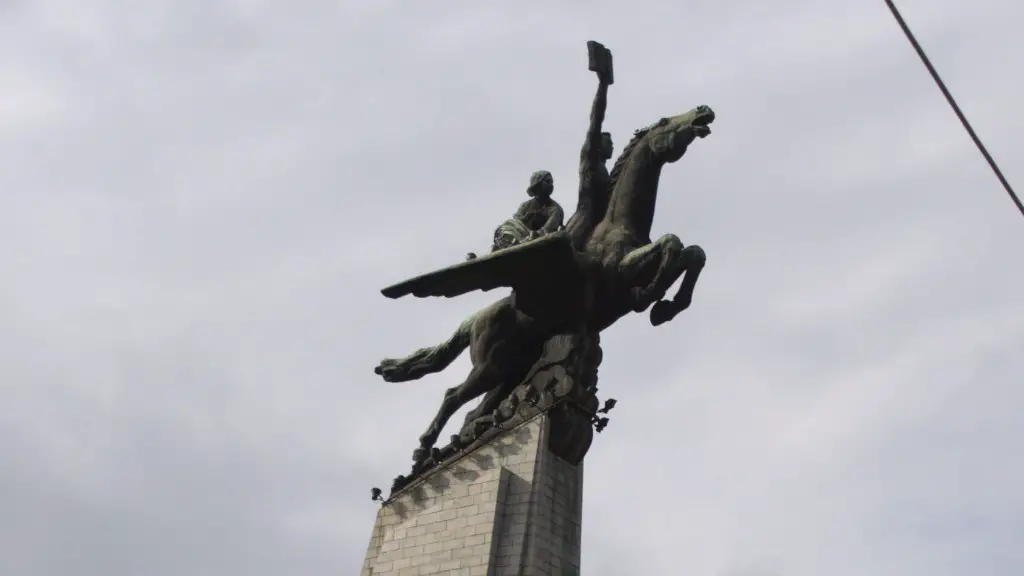Background Information
North Korea, officially the Democratic People’s Republic of Korea, is a country in East Asia that is governed as an authoritarian one-party state. It is bordered by China to the north and South Korea to the south and shares a maritime border with Japan and Russia. North Korea has long been ruled by a single family: the Kim dynasty, which has been in power since the country’s founding in 1948. Over the years, the succession of leadership has shifted from deceased leaders to sons, culminating with the current leader, Kim Jong-un, being the third son of the late Kim Jong-il.
Rise of Kim Jong-un
In December 2011, North Korean state-run media announced that Kim Jong-un had been made the supreme leader of the country, following the death of his father Kim Jong-il. Kim Jong-un was seen as a powerful and popular leader, receiving praise from North Koreans and the international community for his efforts to open the country up to potential investors, smooth relations with its neighbors, and play a role in the historic negotiations between North Korea and the United States of America.
With the announcement of his rise to power, there was speculation as to who was behind his rise to power. While it is assumed that Kim Jong-un was chosen largely through a hereditary succession system which is still practiced in North Korea, it is possible that he had the backing of important figures within the military and the Workers’ Party of Korea (WPK), North Korea’s ruling party. He also appeared to have been groomed and trained to succeed his father since a young age.
Kim Jong-un’s Present Rule
Under the rule of Kim Jong-un, North Korea remains a tightly controlled country in which information and development are controlled strictly by the state. Despite global calls for reform and a noticeable improvement in the country’s own standards of living, North Korea has maintained a much more closed-off policy than its neighbors. International relations between North Korea and other nations remain relatively contentious, largely due to the nation’s growing nuclear capabilities.
Kim Jong-un continues to pursue his father’s legacy of achievements for the country, investing heavily in modern weapon systems and nuclear development. However, in recent years, he has made a marked shift towards engaging in diplomacy, which has led to some progress in easing tensions on the peninsula, improving relations with South Korea, and engaging in negotiations with the U.S. and other countries.
Internal Politics
Kim Jong-un remains the Supreme Leader of North Korea, with ultimate authority over all decisions and policies. He is supported by the WPK and a powerful military. Under his rule, North Korea has seen some economic gains, although economic development has been severely limited due to widespread international sanctions.
There have also been reports of an entrenched power struggle between Kim Jong-un and his close adviser Kim Yong-chol, a former spymaster and North Korea’s senior official to the United States. There is speculation that this rivalry could threaten the stability of Kim Jong-un’s rule.
Tackling Human Rights Abuses
Despite the country’s advances in nuclear capabilities, North Korea still remains one of the world’s most repressive countries. The United Nations’ Commission of Inquiry (COI) on Human Rights in North Korea has extensively documented the extent of human rights abuses in North Korea, which include torture, public executions, beatings, forced labor, and an extensive network of prison camps.
Kim Jong-un has been accused of allowing these abuses to continue, as well as implementing new oppressive policies such as the “anti-marketization” campaign which targets entrepreneurs and other citizens who have gained wealth in the private market. The human rights situation in North Korea remains of great concern to the international community.
International Engagement
Kim Jong-un has been accused of allowing these abuses to continue, as well as implementing new oppressive policies such as the “anti-marketization” campaign which targets entrepreneurs and other citizens who have gained wealth in the private market. The human rights situation in North Korea remains of great concern to the international community.
International Engagement
In recent years, North Korea has shifted away from its hostile posture towards the international community, engaging in talks with its neighbors and the U.S. The most notable development in these talks was the signing of the Singapore Declaration between the U.S. and North Korea in June of 2018. This agreement represented the first time that the U.S. and North Korea had publicly agreed on a plan for denuclearization and international peace.
However, this agreement has yet to be fully implemented, and the progress on denuclearization has been slow. As a result, the U.S. and many other nations remain wary of North Korea’s commitment to real reform.
The Role of International Sanctions
The international community has imposed a number of economic sanctions on North Korea in an attempt to curb its nuclear and missile programs. These sanctions have had a marked effect on the North Korean economy, including a 10% decline in GDP between 2016 and 2017. However, there are some who argue that in the long-term, sanctions are unlikely to be effective in curbing the country’s weapons programs and could even exacerbate the country’s economic issues, leading to further deprivation for North Korean citizens.
China’s Influence
As North Korea’s closest ally, China has significant sway over the country, both economically and politically. China has been a key player in international negotiations relating to North Korea, hosting talks between the U.S. and North Korea and providing economic aid and resources to the country.
Although China’s relationship with North Korea has been strained at times, the Chinese government remains committed to avoiding conflict on the Korean peninsula and maintaining the status quo. As a result, they have taken a relatively hands-off approach to the country’s nuclear weapons program and ongoing human rights abuses.
Future Prospects
At present, it is difficult to predict the future of North Korea under the leadership of Kim Jong-un. Despite some progress in negotiations and diplomacy, tensions between North Korea and the international community remain high and the country’s nuclear weapons program remains a major concern.
There is also the question of what will happen to North Korean society following the death of its leader. With no clear successor as of yet, there is growing concern for the country’s future in the event of instability or sudden power shift in the country. It remains to be seen how North Korea’s current leader will continue to steer the country and its citizens in the years to come.


